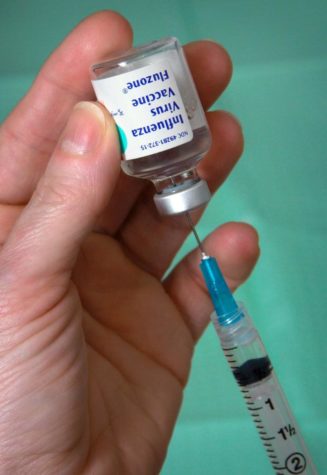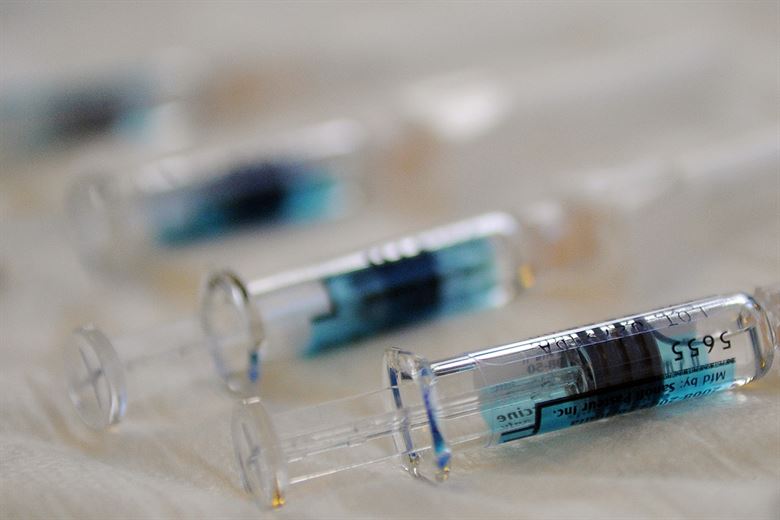A dosage of controversy
January 10, 2019
Edward Jenner created the first successful smallpox vaccine in 1796. Since then, we have had various disease outbreaks and various vaccines to prevent us from catching them.
Ever since then we have created many vaccines, and you definitely been given a couple of them; especially after you were born and during your childhood years, as they prevent us from getting infected by harmful diseases.
A controversial topic has been floating around that states vaccines cause autism. This has scared many people and has influenced their decision when it’s time to get vaccinated.
This can also be very harmful for children because it is important to vaccinate them, to prevent them from catching any life changing
This whole topic is very controversial and there are two clear sides to it that both have evidence to support them so now let’s see who’s right so we know whether vaccines are safe.or threatening diseases.
Mr. Singh an English Learning Specialist said “Parents refusing to have their children vaccinated due to concerns that it would lead to Neurological issues”
This whole conspiracy against vaccines began back in 1995 when a group of British researchers published a study in the well known medical journal The Lancet. According to their study, “people who had been vaccinated with the MMR (Measles-Mumps-Rubella) vaccine were more likely to have bowel disease.”
One of the researchers was Andrew Wakefield, a gastroenterologist who further  studied the link between vaccines and Bowel Disease.
studied the link between vaccines and Bowel Disease.
His hypothesis was that infection with the vaccine virus would cause disruption in the intestinal tissue, which will lead to bowel disease and neuropsychiatric disease.
He then recommended that the combination of the MMR vaccines be suspended and single vaccines be given instead over time. Wakefield himself tried to patent for a single-antigen (antibiotic) vaccine for measles in 1997, so it looks like he has a potential financial interest by promoting this view.
Reaction to this was almost immediate. Press outlets covered the whole story, and scared parents started to make less appointments or started refusing them all together.
Mr. Whittaker, the Math teacher at the NYC iSchool, commented, “I think the medical testing for vaccines is pretty thorough,” this shows that most people who first heard the news that vaccines were related to autism would most likely believe it.
Many studies were conducted over the next 12 years to find a link between vaccines and autism, yet no trustworthy or relevant studies have come up that support Wakefield’s findings.
As previously stated, in 2004, Dr. Richard Horton, editor at The Lancet, wrote that Wakefield should have revealed to the Journal that he had been paid by attorneys wanting to file lawsuits against vaccine manufacturers.
Horton said that Wakefield’s research was “fatally flawed” and most of the other researchers/authors that worked with Wakefield retracted their interpretation in the paper. And finally in 2010 The Lancet finally retracted the whole paper itself.
In May 2010, three months after the papers retraction, Britain’s General Medical Council banned Wakefield for practicing medicine in Britain for the “callous disregard for children in the course of his research”-Britain’s General Medical Council.
The council also found the extent to which Wakefield was funded by lawyers hoping to sue vaccine manufacturers on behalf of parents with children who have autism.
On January 6th 2011, the British Medical Journal published a report by Brian Deer, a Journalist who had previously reported on Wakefield’s falsework. Deer spoke with parents of the children in the test and found evidence that showed Wakefield falsified data about the children’s conditions.
The findings in Wakefield’s paper have long been discredited by scientists and the evidence shows that the paper should have ever been published not only because it was poorly conducted but was also the product of research fraud.
Mr. Singh said “when I first heard of it a lot of articles were saying that it was a mis interpretation of a small study that had somehow gotten really popular and everyone just believed it.”
All of the parents instantly believed it just because they were trying to protect their children which is what they are supposed to do. But that’s also the problem, by not giving them vaccines they were actually endangering them.
Another theory after the MMR one died out is that Thimerosal a mercury-containing preservative used in some vaccines might be the problem. Thimerosal has never been used in the MMR vaccine.
In the late 1990s environmentalists were concerned about exposures to mercury, especially the ingestion of fish that contains mercury. With people worrying about the dangers of mercury the U.S. Food and Drug administration in 1999 requested, that companies report on the amount of mercury in their products.
It ended up that the amount of mercury in vaccines in the form of Thimerosal exceeded the FDA’s guidelines. The mercury in fish (Methylmercury) at high levels can have harmful neurological effects.
But the mercury in Thimerosal when metabolized in the body it becomes Ethylmercury, which at the time was considered to be much less harmful then Methylmercury.
But the FDA had a dilemma. They didn’t know whether they should apply the guidelines for Methylmercury to Ethylmercury. Since they weren’t able to answer these questions with the help of the American Academy of Pediatrics, they told vaccine companies they had to reduce or eliminate the use of Thermiosal in their products.
Activists and others were unsure about the safety of Thimerosal at this point, but they thought that exposure to mercury in vaccines could cause autism. The Institute of Medicine did a comprehensive safety review of the issue.
Their preliminary report published in 2001 said that they did not find enough evidence to take a side on whether Thimerosal is related to autism. But their final report, in 2004 came to the conclusion that their evidence since 2001 favored the idea that there is no connection between Thimerosal and autism.
Science teacher Ms. Wallace said that “From a scientific [Perspective], Autism is not a virus or a disease, and the definition of a vaccine is a dead or weakened version of a virus.” So how could Autism be caused by vaccines if they not related in any way?
Ever since then, there have been many studies conducted that don’t support the Thimerosal controversy and support the Institute of Medicine’s conclusion. But today Thimerosal isn’t used in most childhood vaccines but it isn’t because it causes autism but instead the quantity of Mercury it contains.
Even though it has been proven many times that vaccines don’t cause autism, there are still believers who refuse to get vaccinated. I guess the controversies over based off of many studies, The Lancet and Britain’s General Medical Council it’s been proven that vaccines have no relation to Autism.


